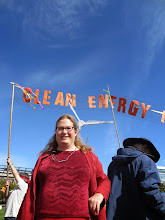Contact: Jane Pulaski
Recent federal decisions allow new options for state DG policy
The Interstate Renewable Energy Council, Inc. (IREC) has released a concept paper that
considers states' ability to expand options for distributed generation
(DG) technologies. Due to the rapidly growing appetite for solar and
other forms of renewable and alternative energy in the U.S., developers,
utilities and policymakers are seeking new approaches that could
appropriately value the locational benefits of DG. The 1978 federal
Public Utilities Policy Regulatory Act (PURPA) may provide a solution
that supports greater DG development close to load, where DG value is
highest.
This paper, Unlocking DG Value: A PURPA-based approach to promoting DG growth, explores
benefits that can be quantified and incorporated into the development
of PURPA-based avoided cost rates. "This approach may allow states the
flexibility to accurately reflect many of the positive contributions of
distributed generation," said Jane Weissman, president and CEO of IREC.
"IREC has been a thought leader on clean energy and policy development
for more than 30 years."
A
comprehensive PURPA-based approach to DG policy design would
incorporate many as-yet-unquantified benefits of exports to the
distribution system, including line-loss avoidance; the ability to make
smaller capacity additions that more closely follow incremental load
changes; the deferral or avoidance of utility capital expenditures; and
the environmental benefits of displacing fossil-based resources.
This paper describes
several recent Federal Energy Regulatory Commission (FERC) decisions
that have provided the needed justification to value the benefits of DG
facilities and it discusses the advantages and disadvantages of such an
approach. The paper concludes that several considerations may need to be
addressed before PURPA could become a viable option for promoting DG
growth in many states.
This paper
essentially explores the possibility for state policymakers to
re-evaluate and revitalize PURPA as another option for the policy
toolkit," said Kevin Fox, lead author of the paper. "While there may
still be hurdles to deploying this policy option in a manner that would
support widespread DG growth, recent movement in this direction is
promising."
About IREC
The
Interstate Renewable Energy Council (IREC) is a non-profit organization
that believes clean energy is critical to achieving a sustainable and
economically strong future. To pave this clean energy path, IREC works
to expand consumer access to clean energy; generates information and
objective analysis grounded in best practices and standards; and leads
programs to build a quality clean energy workforce, including a unique
credentialing program for renewable energy and energy efficiency
training programs and instructors. Since 1982, IREC's programs and
policies have benefitted energy consumers, policymakers, utilities and
the clean energy industry. Visit www.irecusa.org


No comments:
Post a Comment